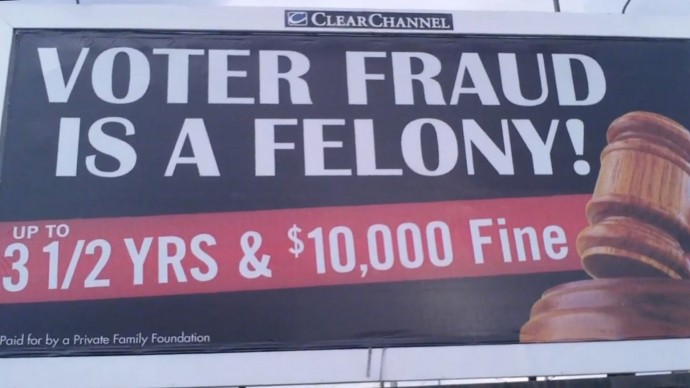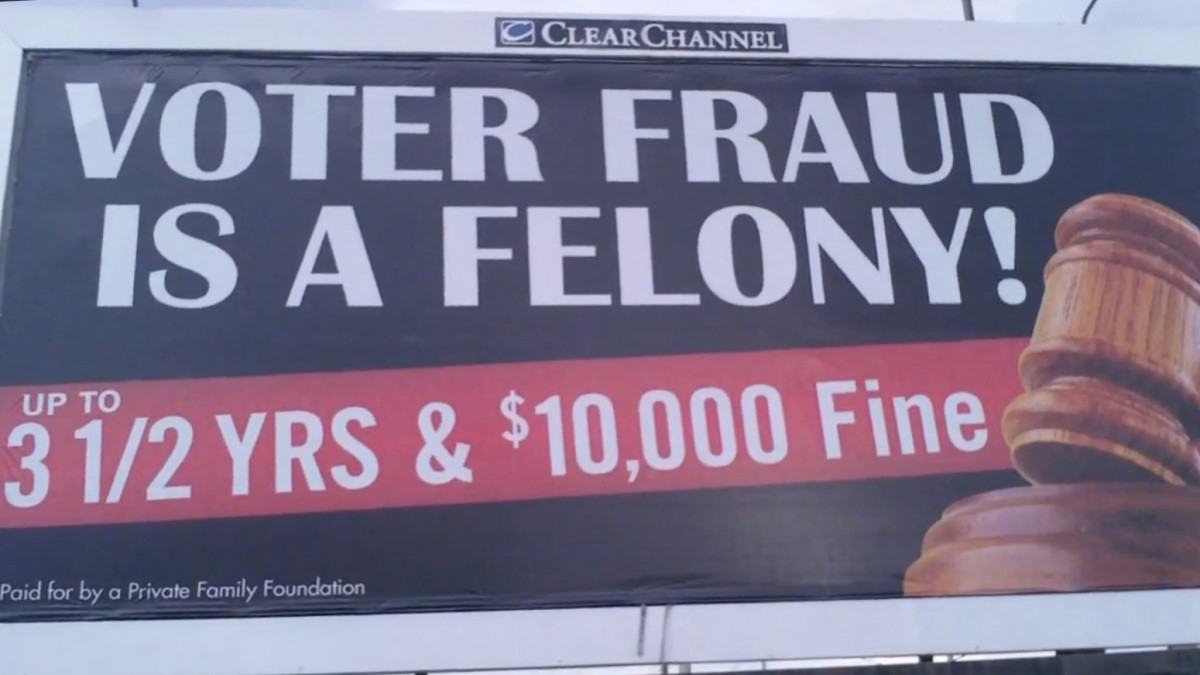
“There has never been in my lifetime, since we got rid of the poll tax and all the Jim Crow burdens on voting, the determined effort to limit the franchise that we see today. Why should we disenfranchise people forever once they’ve paid their price?”– Former president Bill Clinton
(MintPress) – An online civil rights group is calling for the removal of billboards in two political swing states that the organization says are meant to intimidate voters in black and Latino neighborhoods. In areas in Ohio and Wisconsin, signs detailing the maximum punishment for “voter fraud” are shown – saying that violators could get up to three-and-a-half years in prison and a $10,000 fine. ColorOfChange said the billboards are both misleading and “one of the nastiest voter suppression schemes” the group had ever seen.
While the group that bought the billboards remains anonymous, it is a continued push from the right that has overblown voter fraud for nearly a decade.
Rashad Robinson, executive director at ColorOfChange, said the billboard is a tactic to keep people of color away from voting booths on Election Day. Robinson also called upon Clear Channel Communication – a global media and entertainment company that owns billboards across the country – to take the signs down. Clear Channel has said that those who took out the advertisement are responsible for the content, but Robinson points out that Clear Channel has rejected controversial billboards in the past.
It is important to point out that Clear Channel is owned by Bain Capital, and it broadcasts conservative radio commentators such as Rush Limbaugh and Glenn Beck, who have been big proponents of voter ID legislation across the country. Bain has also become a focal point of this year’s presidential elections, as Republican presidential candidate Mitt Romney was a co-founder of the venture capitalist conglomerate. Robinson, in a letter to ColorOfChange members, exposes the link between the billboards and Clear Channel and further sheds light on the issue.
“These billboards are clearly designed to intimidate voters, and they’re part of a coordinated right-wing attack on the voting rights of people of color,” Robinson wrote. “The billboards are hosted by Clear Channel, a media conglomerate owned by Bain Capital — the same company that Mitt Romney co-founded. Clear Channel has tried to avoid any responsibility for the ads, saying that the group who paid for them is responsible for the content. But Clear Channel has rejected billboard ads many times in the past.”
Eying a demographic
ColorOfChange noted that the billboards did not appear in any predominantly white neighborhoods and said the strategy is discriminatory and politically charged. Republicans are overwhelmingly unpopular with racial and ethnic minority groups, and their participation in the 2008 election largely contributed to the success of President Barack Obama.
In 2008, voter turnout was the highest it had been in 60 years, with dramatic increases in voting participation from ethnic and racial minorities, low-income Americans and women voters. Those groups voted primarily democratic, propelling Obama to victory.
The advertisements are also meant to stoke fear of doing something wrong at the polls, potentially deterring participation in the election, ColorOfChange says. Recent attempts to push through voter ID legislation have meant that voters would be required to show state-issued photo identification or driver’s license. Critics say that laws unfairly target poor and minority populations, who do not always have a driver’s license and may not have the means to obtain one.
The civil rights group argues that Clear Channel often says it will not post politically charged billboards, but it has agreed to in this instance.
“Allowing an anonymous advertiser to create an atmosphere of fear around voting just as the early voting period begins is unacceptable,” ColorOfChange wrote in a letter to Clear Channel. “… This campaign of misinformation fits that criteria and is a dangerous disservice to the black and Latino communities in which they are placed.”
But for Arisha Michelle Hatch, campaign director at ColorOfChange, the billboards are just a sample of a larger problem that suspends the idea of corruption and fraud over the elections. Studies suggest that claims of voter fraud and instances involved are often overblown. In Florida, one of the states that request photo identification in order to vote, there were said to be more instances of shark attacks than voter fraud between 2008 and 2010.
In an interview with MintPress, Hatch expressed concern that the signs could scare eligible voters away from the polls simply because they fear repercussion of an overblown issue. Hatch said that efforts are already underway to encourage voters in those neighborhoods to vote without fear.
“We’ve seen these types of voter intimidation tactics, and right now groups are working to respond to these intimidating billboards by educating people in those communities about what their intention is behind them,” Hatch said. “They do pose a threat. We shouldn’t be making the exercise of voting a fearful exercise for people.”
Unfounded issue
Statistics from the Brennan Center suggest that of the states that have voter identification laws in the books, 10 percent of eligible voters do not currently have the proper documentation to abide by the law. As a result, states like Kansas and Pennsylvania could see a 2.4 percent decrease in voter participation. In Philadelphia, state-required identification to vote could cause as much as 43 percent of the city to possibly be ineligible.
And for what? A report by Rolling Stone found that there has not been a case of voter fraud in which a noncitizen knowingly registered a vote during the election. In fact, many of the mistakes made at the polls during elections are clerical errors and not the fault of voters.
That, however, has not stopped states from pressing on. In Florida, the United States Justice Department called on Republican Gov. Scott Walker to halt his voter purge. Scott has introduced various bills that aim to cut down on voter fraud, but the Justice Department said the legislation unfairly targets minorities.
It is something states are investing time and resources in as well, only to come up empty. In 2005, the state of Washington investigated the status of 1668 registered voters who had “foreign sounding names.” The state was convinced that there had been excess votes submitted by false identities. As it turned out, not a single voter investigated turned out to be a noncitizen.
“They create an atmosphere of fear around voting. There is one particular group call Truth or Vote that says it mission is to make people feel like there are police in their rear view mirror when they go out to vote,” Hatch said. “By placing these ads in low-income communities and communities of color, these billboards are meant to intimidate people around something that should be a fundamental right – their right to vote.”
Hatch also said that the efforts are a targeted, politically motivated attack by the right-wing to suppress votes traditionally awarded to democrats.
“It’s clear that this is an attempt to make it harder for people of color, women and senior to vote,” Hatch said. “And it’s just unfortunate that we’re having a conversation about barriers when we should be having a conversation on how to make it easier to vote.”


